人教版九年级英语重难点讲解
人教版九年级英语unit3知识点,单词讲解
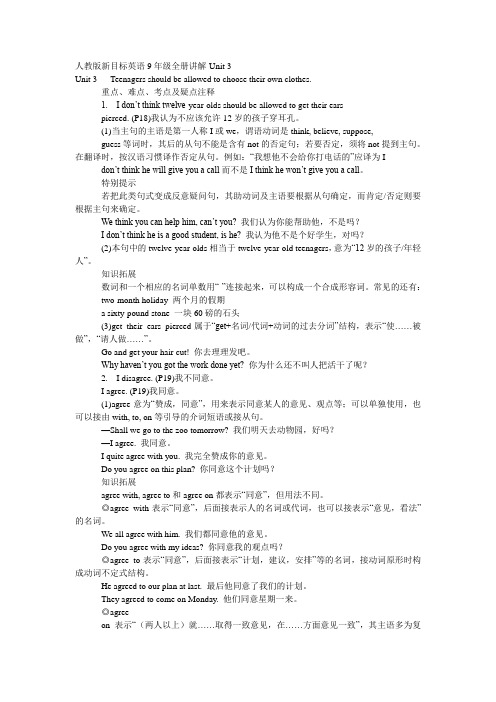
人教版新目标英语9年级全册讲解-Unit 3Unit 3 Teenagers should be allowed to choose their own clothes.重点、难点、考点及疑点注释1. I don’t think twelve-year-olds should be allowed to get their earspierced. (P18)我认为不应该允许12岁的孩子穿耳孔。
(1)当主句的主语是第一人称I或we,谓语动词是think, believe, suppose,guess等词时,其后的从句不能是含有not的否定句;若要否定,须将not提到主句。
在翻译时,按汉语习惯译作否定从句。
例如:“我想他不会给你打电话的”应译为I don’t think he will give you a call而不是I think he won’t give you a call。
特别提示若把此类句式变成反意疑问句,其助动词及主语要根据从句确定,而肯定/否定则要根据主句来确定。
We think you can help him, can’t you? 我们认为你能帮助他,不是吗?I don’t think he is a good student, is he? 我认为他不是个好学生,对吗?(2)本句中的twelve-year-olds相当于twelve-year-old teenagers,意为“12岁的孩子/年轻人”。
知识拓展数词和一个相应的名词单数用“-”连接起来,可以构成一个合成形容词。
常见的还有:two-month holiday 两个月的假期a sixty-pound stone 一块60磅的石头(3)get their ears pierced属于“get+名词/代词+动词的过去分词”结构,表示“使……被做”,“请人做……”。
Go and get your hair cut! 你去理理发吧。
2020人教版九年级英语上Unit4课文重难点讲解与练习
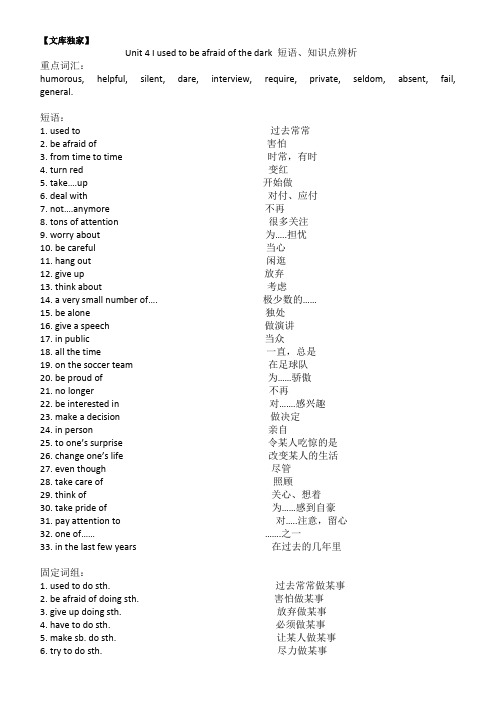
【文库独家】Unit 4 I used to be afraid of the dark 短语、知识点辨析重点词汇:humorous, helpful, silent, dare, interview, require, private, seldom, absent, fail, general.短语:1. used to 过去常常2. be afraid of 害怕3. from time to time 时常,有时4. turn red 变红5. take….up 开始做6. deal with 对付、应付7. not….anymore 不再8. tons of attention 很多关注9. worry about 为…..担忧10. be careful 当心11. hang out 闲逛12. give up 放弃13. think about 考虑14. a very small number of…. 极少数的……15. be alone 独处16. give a speech 做演讲17. in public 当众18. all the time 一直,总是19. on the soccer team 在足球队20. be proud of 为……骄傲21. no longer 不再22. be interested in 对…….感兴趣23. make a decision 做决定24. in person 亲自25. to one’s surprise 令某人吃惊的是26. change one’s life 改变某人的生活27. even though 尽管28. take care of 照顾29. think of 关心、想着30. take pride of 为……感到自豪31. pay attention to 对…..注意,留心32. one of………….之一33. in the last few years 在过去的几年里固定词组:1. used to do sth. 过去常常做某事2. be afraid of doing sth. 害怕做某事3. give up doing sth. 放弃做某事4. have to do sth. 必须做某事5. make sb. do sth. 让某人做某事6. try to do sth. 尽力做某事7. adj. + enough to do sth. 足够……而能做某事8. be prepared to do sth. 准备做某事9. see sb. doing sth. 看见某人在做某事10. take up doing sth. 开始做某事11. begin to do sth. 开始做某事12. require sb. to do sth. 要求某人做某事13. decide to do sth. 决定做某某14. make a decision to do sth. 决定做某事15. It’s hard to believe that……很难相信……….16. It has been + 一段时间+ since + 从句自从……以来已经有很长的时间了17. dare to do sth. 敢于做某事18. It’s + adj. + for sb. + to do sth. 对某人来说做某事是……的重点句型:1. I used to be afraid of the dark. 我过去常常怕黑。
[精]人教版九年级英语下册重难点讲解-全
![[精]人教版九年级英语下册重难点讲解-全](https://img.taocdn.com/s3/m/e71b3ea6ee06eff9aff8076b.png)
人教版九年级英语下册重难点讲解Unit 1 How can we become good learners?Section A1. by reading the textbook【解析】watch/read/see/look at "看" 法不同(1)看电视、看比赛、看表演用watch; watch TV 看电视(2)看书、看报、看杂志用read read the book看书(3)看电影、看医生用see see the doctor 看医生(4) 看黑板、看地图用look at look at the blackboard 看黑板【记】______the picture. Can you see the man in the picture? He isn't ________ the book. He is ______TV.2. by asking the teacher for help【解析】ask for 请求,要某物ask sb. about sth 向某人询问关于某事(1)ask sb. for help 向某人请求帮助(2) ask sb. (not) to do sth请求某人做某事【2013北京中考】Our teacher often asks us _____ questions in groups.A. discussB. to discussC. discussingD. discussed3. I study by working with a group. 我通过小组学习。
【解析】by/with/in/on "用" 法不同◆by的用法:(1)by doing sth 通过…方式by studying with a group【注】介词短语作方式状语,回答以How开头的问句,表示"怎样做"。
①I study English by ___________(listen) to the tapes②Tom learns Chinese by ____________(watch) Chinese movies.③-- ____ did you get there? —By ___ a taxi.A. How; takingB. How ; takeC. How; tookD. What; taking(2) by+ 交通工具(交通工具前不能加限定词)by bike by train【by短语】by the way 顺便问一下by accident= by chance 偶然地by mistake 错误地one by one 一个接一个step by step 一步一步地little by little 逐渐地by the end of 到….... 末尾by the time 到……为止by oneself 独自地by and by 不久之后by hand 用手◆with 的用法:表示用某种工具(1) with +工具We like to write with a pen.(2)with+人体部位We see with our eyes.◆in 的用法:通常与"衣着、声音、书写材料"等名称连用in+语言in English 用英语speak in a soft voice◆on 的用法:on +电器或媒介on TV /radio/Internet ( ) The boy was cutting a branch of a tree ____ a knife.A. inB. byC. withD. use4. Do you learn English by watching videos?【解析】learn →learned/learnt→learned/learnt v 学习learn about 了解(1) learn from sb. 向某人学习(2) learn to do sth 学着做某事(3)learn …by oneself= teach oneself 自学①We should _________ ________ the hard- working students.(向……学习)5. What about reading aloud to practice pronunciation?【解析1】用于提建议的句型有:(1)What about doing sth ?=How about doing sth? ….怎么样?(2)Why don't you do sth?= Why not do sth? 为什么不呢?(3)Let's do sth.让我们一起做某事吧。
人教版九年级英语Unit9单元重难点语法突破(含答案)
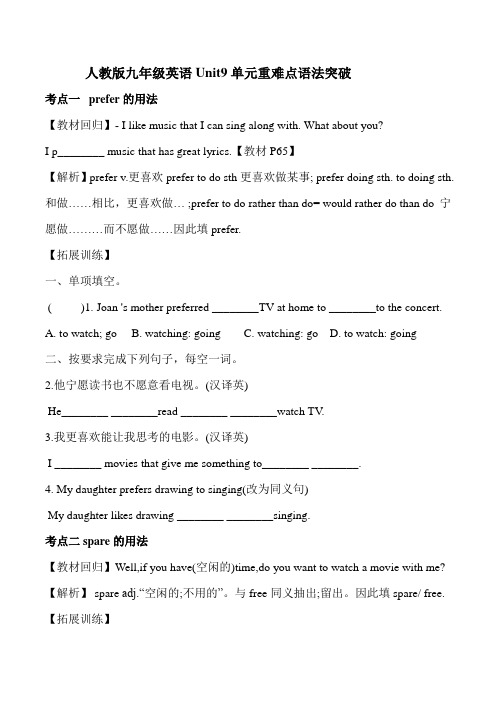
人教版九年级英语Unit9单元重难点语法突破考点一prefer的用法【教材回归】- I like music that I can sing along with. What about you?I p________ music that has great lyrics.【教材P65】【解析】 prefer v.更喜欢 prefer to do sth更喜欢做某事; prefer doing sth. to doing sth.和做……相比,更喜欢做… ;prefer to do rather than do= would rather do than do宁愿做………而不愿做……因此填 prefer.【拓展训练】一、单项填空。
( )1. Joan 's mother preferred ________TV at home to ________to the concert.A. to watch; goB. watching: goingC. watching: goD. to watch: going二、按要求完成下列句子,每空一词。
2.他宁愿读书也不愿意看电视。
(汉译英)He________ ________read ________ ________watch TV.3.我更喜欢能让我思考的电影。
(汉译英)I ________ movies that give me something to________ ________.4. My daughter prefers drawing to singing(改为同义句)My daughter likes drawing ________ ________singing.考点二 spare的用法【教材回归】Well,if you have(空闲的)time,do you want to watch a movie with me? 【解析】 spare adj.“空闲的;不用的”。
2020人教版九年级英语上Unit1课文重难点讲解
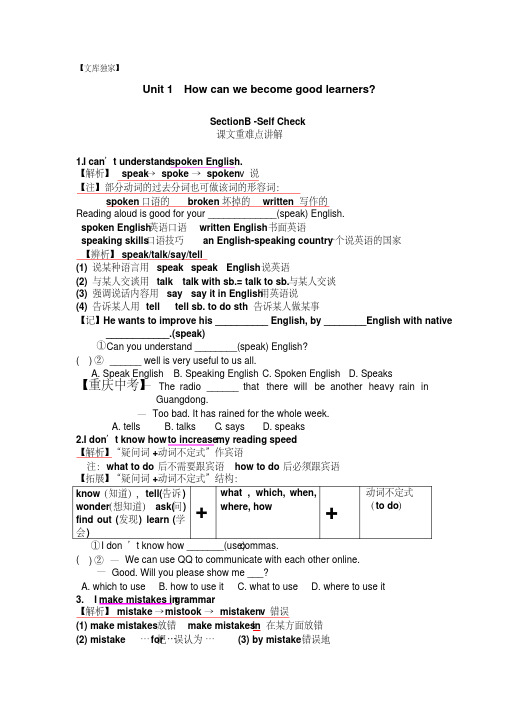
【文库独家】Unit 1 How can we become good learners?SectionB -Self Check课文重难点讲解1.I can’t understand spoken English.【解析】speak→spoke →spoken v说【注】部分动词的过去分词也可做该词的形容词:spoken 口语的broken 坏掉的written 写作的Reading aloud is good for your _____________(speak) English.spoken English 英语口语written English 书面英语speaking skills 口语技巧an English-speaking country 一个说英语的国家【辨析】speak/talk/say/tell(1) 说某种语言用speak speak English 说英语(2) 与某人交谈用talk talk with sb.= talk to sb. 与某人交谈(3) 强调说话内容用say say it in English 用英语说(4) 告诉某人用tell tell sb. to do sth 告诉某人做某事【记】He wants to improve his __________ English, by ________English with native ____________.(speak)①Can you understand ________(speak) English?( )②______ well is very useful to us all.A. Speak EnglishB. Speaking EnglishC. Spoken EnglishD. Speaks【重庆中考】—The radio ______ that there will be another heavy rain inGuangdong.—Too bad. It has rained for the whole week.A. tellsB. talksC. saysD. speaks2.I don’t know how to increase my reading speed【解析】“疑问词+动词不定式”作宾语注:what to do 后不需要跟宾语how to do 后必须跟宾语【拓展】“疑问词+动词不定式”结构:know(知道),tell(告诉)wonder(想知道)ask(问) find out (发现) learn (学会) +what , which, when,where, how +动词不定式(to do)①I don’t know how _______(use) commas.( )②—We can use QQ to communicate with each other online.—Good. Will you please show me ___?A. which to useB. how to use itC. what to useD. where to use it3. I make mistakes in grammar【解析】mistake→mistook →mistaken v错误(1) make mistakes 放错make mistakes in在某方面放错(2) mistake …for… 把…误认为… (3) by mistake 错误地。
人教版九年级英语全册重点单词+短语+句型知识讲解
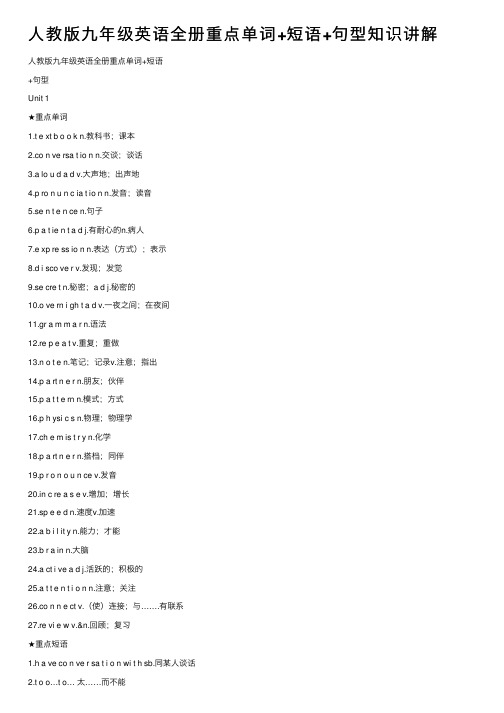
⼈教版九年级英语全册重点单词+短语+句型知识讲解⼈教版九年级英语全册重点单词+短语+句型Unit 1★重点单词1.t e xt b o o k n.教科书;课本2.co n ve rsa t io n n.交谈;谈话3.a lo u d a d v.⼤声地;出声地4.p ro n u n c ia t io n n.发⾳;读⾳5.se n t e n ce n.句⼦6.p a t ie n t a d j.有耐⼼的n.病⼈7.e xp re ss io n n.表达(⽅式);表⽰8.d i sco ve r v.发现;发觉9.se cre t n.秘密;a d j.秘密的10.o ve rn i gh t a d v.⼀夜之间;在夜间11.gr a m m a r n.语法12.re p e a t v.重复;重做13.n o t e n.笔记;记录v.注意;指出14.p a rt n e r n.朋友;伙伴15.p a t t e rn n.模式;⽅式16.p h ysi c s n.物理;物理学17.ch e m is t r y n.化学18.p a rt n e r n.搭档;同伴19.p r o n o u n ce v.发⾳20.in c re a s e v.增加;增长21.sp e e d n.速度v.加速22.a b i l it y n.能⼒;才能23.b r a in n.⼤脑24.a ct i ve a d j.活跃的;积极的25.a t t e n t i o n n.注意;关注26.co n n e ct v.(使)连接;与…….有联系27.re vi e w v.&n.回顾;复习★重点短语1.h a ve co n ve r sa t i o n wi t h sb.同某⼈谈话2.t o o…t o… 太……⽽不能3.t h e se cr e t t o… ……的秘诀4.b e a f r a id o f d o in g st h./b e a f ra id t od o st h.害怕做某事5.l o o k u p查阅6.r e p e a t o u t lo u d⼤声跟读7.m a ke m i st a k e s i n在……⽅⾯犯错误8.co n n e ct……wi t h… 把……和……连接/联系起来9.ge t b o re d感到厌烦10.b e st re sse d o u t焦虑不安的11.p a y a t t e n t io n t o注意;关注12.d e p e n d o n取决于;依靠13.t h e a b il it y t o d o st h..做某事的能⼒★重点句型1.提建议的句⼦:①W h a t/h o w a b o u t+d o in g st h?做……怎么样?如:W h a t/H o w a b o u t go in g sh o p p in g?②W h y d o n't yo u+d o st h?你为什么不做……?如:W h y d o n't yo u g o sh o p p in g?③W h y n o t+d o st h?为什么不做……?如:W h y n o t go sh o p p in g?④L e t's+d o st h.让我们做……吧。
九年级英语下教案人教版Unit 12 You’ re supposed to shake hands 重难点解析1

Unit 12 You’ re supposed to shake hands 重难点解析1[教材全析] 友情提示 SECTION ALanguage Goal:Tell what you are supposed to do.语言目标: 讲一下你应该干什么。
例题探究:He is supposed ________ (ask) what to do. 解析:be supposed to do sth. 答案:to ask1a What do people do when they meet for the first time?Match the countries and the customs.当人们第一次见面时,他们干什么?将国家和其风俗习惯对应起来。
In your country,what are you supposed to do when you meet someone for the first time?在你们国家,你第一次遇见一个人应该干什么? You’re supposed to shake hands. 你应该握手。
1c Talk about what people in different countries do when they meet for the first time.Tell about the countries listed above or other countries you know about.谈论在不同的国家里当人们第一次见面时他们干什么。
谈一谈上面列举的或者你知道的国家。
A:What are people in Korea supposed to do when they meet for the first time?在朝鲜,人们第一次见面应该干什么? B:They’re supposed to bow. 应该鞠躬。
2a Maria is an exchange st night she had dinner at anbe supposed to do sth.应该干某事, 被期望做某事shake hands 握手shake head 摇头 1a 答案:2.b3.a4.b5.afor the first time 第一次, 注意for 的用法:第几次前要用for 。
人教版九年级英语各单元难点概括
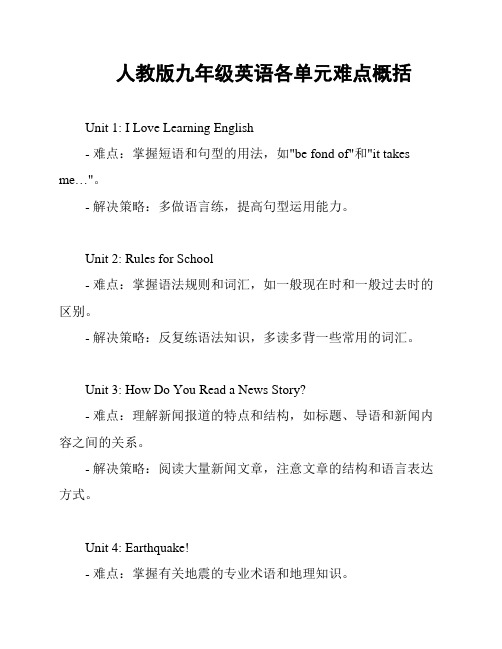
人教版九年级英语各单元难点概括Unit 1: I Love Learning English- 难点:掌握短语和句型的用法,如"be fond of"和"it takes me…"。
- 解决策略:多做语言练,提高句型运用能力。
Unit 2: Rules for School- 难点:掌握语法规则和词汇,如一般现在时和一般过去时的区别。
- 解决策略:反复练语法知识,多读多背一些常用的词汇。
Unit 3: How Do You Read a News Story?- 难点:理解新闻报道的特点和结构,如标题、导语和新闻内容之间的关系。
- 解决策略:阅读大量新闻文章,注意文章的结构和语言表达方式。
Unit 4: Earthquake!- 难点:掌握有关地震的专业术语和地理知识。
- 解决策略:研究地震的基本知识,如震中、震源和地震破坏。
Unit 5: Bicycles- 难点:理解和运用非谓语动词,如动名词和不定式。
- 解决策略:研究非谓语动词的用法和常见搭配,进行相关练。
- 难点:掌握一般将来时的用法和句式。
- 解决策略:多运用一般将来时进行日常语言交流,加深理解并熟练运用。
Unit 7: Will people have robots?- 难点:理解和表述将来可能发生的事情,运用将来时态。
- 解决策略:多参与讨论,提高表达能力,并结合实际情境练运用。
Unit 8: I'll help clean up the city parks.- 难点:掌握情态动词的用法,如"should"和"will"。
- 解决策略:阅读和听力练,多注意情态动词在不同语境中的意义。
Unit 9: When was it invented?- 难点:了解并陈述一些发明和发现的历史背景。
- 解决策略:积累相关知识,多阅读和研究历史资料。
以上是人教版九年级英语各单元的难点概括,针对每个单元的难点,可以采取相应的解决策略进行学习和练习。
- 1、下载文档前请自行甄别文档内容的完整性,平台不提供额外的编辑、内容补充、找答案等附加服务。
- 2、"仅部分预览"的文档,不可在线预览部分如存在完整性等问题,可反馈申请退款(可完整预览的文档不适用该条件!)。
- 3、如文档侵犯您的权益,请联系客服反馈,我们会尽快为您处理(人工客服工作时间:9:00-18:30)。
I u s e d t o b e a f r a i d o f t h e d a r k重点词汇与短语1.terrify使害怕、使恐惧 2.chew咀嚼3.afford买得起 4.cause造成、引起5.chat聊天6.patient有耐心的、忍耐的7.decision决定、决心8.necessary必须的、必要的9.waste浪费、滥用edto过去常常11.beinterestedin对......感兴趣12.beafraid(terrified)of害怕、恐怕13.ontheswimteam在游泳队14.withthebedroomlighton开着卧室的灯15.giveup放弃16.gotosleep入睡17.getintotroublewith给某人找麻烦18.makeadecision下决心19.toone’ssurprise令人惊奇的是20.takepridein引以为自豪21.payattentionto注意22.nolonger不再课文语法讲解ed?to的用法?:否定形式:usedn’ttododidn’tusetodo反意疑问句:usedn’t/didn’t回答:Yes,Iusedto/Yes,Idid.No,I usedn’tadj:useful/uselessadv:usefully/uselesslyausedcar=asecond-handcar“used?to加不定式”表示过去常常干某事,现在不在干了。
?be?used?to?doing表示习惯于干某事。
?beusedtodo被用来做… use…todo…用…来做…be/getusedtodoing习惯于做2.beafraidto与beafraidof的用法区别英语语法beafraidofdoing担心出现doing的状况、结果。
doing是客观上造成的,意为“生怕,恐怕”。
3..beinterestedin;interest中考英语重点单词1)?interest作名词。
①意为“兴趣”时,常作不可数名词。
常见短语show?/?have?interest?in?(doing)?sth.,意为“对……表现出?/?有兴趣”。
如: She?showed?great?interest?in?the?meeting.她对这次会议表现出极大的兴趣。
②意为“业余爱好”或“感兴趣的事”时,常作可数名词。
如:He?has?two?great?interests.?One?is?sports?and?the?other?is?music.?他有两大爱好:一个是体育,另一个是音乐。
2).?interested是形容词,常用结构be?interested?in?(doing)?sth.意为“对(做)……感兴趣”,主语是人。
如:John?is?interested?in?history.??约翰喜欢历史。
He?is?interested?in?drawing?pictures.他对画画感兴趣。
3).?interesting也是形容词,意为“令人感兴趣的”,既可以作表语,也可以作定语。
4.terrifyvt.使害怕;使恐惧terrifysbterrifying可怕的sbbeterrifiedof=beveryafraidofbeterrifiedthat5.gotosleep入睡gotosleep入睡=gettosleep=fallasleepgotobed上床睡觉beasleep睡着了asleepingbag睡袋;sleepingpills安眠药;asleepingcar卧铺火车6.chat聊天,先谈chatted-chattedChatwith/tosbaboutsthChattingroom聊天室gossip 八卦短语dieof死于疾病,饥饿,寒冷等内部因素diefrom死于(车祸等外部因素)9.afford=haveenoughtime/moneytodosth买得起,负担得起常于can,could,beableto 连用10.patientn.病人adj.有耐心的<==>没有耐心的impatientn.patience<==>impatiencedosthwithpatience=dosthpatiently bepatientwithsb/atstheg:I’malwayspatientwithmylittledog.11.intheend=atlast=finally最后<==>inthebeginningattheendof在…的末尾,在…末端(时间,空间)<==>atthebeginningofbytheendof在...+时间段用于过去完成时/将来完成时12.decisionn.决定,决心cnmakeadecision todo=decidetodo=makeupone’smindtodo13.necessaryeg:Itisnecessaryforsbtodosth=sbneedstodosth=thereisneedforsbtodosth.sbfind/think/supposeit(is)necessarytodosth.It’snecessaryforustoknowwhatwewanttobeinthefuture.14.eventhough(1)=evenif即使,纵然,(2)=although/though虽然Icanstillremember,eventhoughitwassolongago.虽然这是很久以前的事情,我还是记得。
15.nolonger不再已不,Nomore与瞬时动词连用,表程度不再增加,次数不再重复,nolonger与延续性动词或表示状态的词连用,表示时间上的“不再”持续,(过去曾经......,现在不......)。
Thebabynomorecried=Theboydidn'tcriedanymore.(表哭的程度不再增加) Henolongerworks/liveshere.=Hedoesn'tlive\workhereanylonger.(表示过去在这里工作\住,现在不在这里工作\住).{nomore还可表数量上"和......一样不......"常和than 连用,nolonger不行。
Awhaleisnomoreafishthananelephant.(awhale,aelephaht都不是鱼)It'snomorethanakilometretotheschool.)}16.takeprideinAtake/show/feelprideinB=AbeproudofB=BbetheprideofA dosthproudly=dosthwithpride17..attentionvi.attendtodosth.=pay(one’s)attentiontosth/doing(to是介词)专心于(做)……to作介词的短语有:beusedtodoingpreferdoingtodoinglookforwardtodoinggetdowntodoingmakeacontributiontodoing18.giveup放弃,认输giveupsth.giveit/themupgiveupsth/doing=stopdoing=dropdoing Eventhoughtheywereverytired,theydidn’tgiveupdiscussingthequestion.19wastevt.wastesth(time/money)onsb/sthwastetime(in)doingsthn.awasteof对于……的浪费课文知识点edtodosth.过去常常做某事否定形式:didn’tusetodosth./usednottodosth.如:Heusedtoplayfootballafterschool.放学后他过去常常踢足球。
Didheusetoplayfootball?Yes,Idid.No,Ididn’t.Hedidn’tusetosmoke.他过去不吸烟。
2.反意疑问句①肯定陈述句+否定提问如:Lilyisastudent,isn’tshe? LilywillgotoChina,won’tshe?②否定陈述句+肯定提问如:Shedoesn’tcomefromChina,doesshe?Youhaven’tfinishedhomework,haveyou?③提问部分用代词而不用名词Lilyisastudent,isn’tshe?④陈述句中含有否定意义的词,如:little,few,never,nothing,hardly等。
其反意疑问句用肯定式。
如:HeknowslittleEnglish,doeshe?他一点也不懂英语,不是吗?Theyhardlyunderstoodit,didthey?他们几乎不明白,不是吗?3.playthepiano弹钢琴4.①beinterestedinsth.对…感兴趣②beinterestedindoingsth.对做…感兴趣如:Heisinterestedinmath,butheisn’tinterestedinspeakingEnglish.他对数学感兴趣,但是他对说英语不感兴趣。
5.interestedadj.感兴趣的,指人对某事物感兴趣,往往主语是人interestingadj.有趣的,指某事物/某人具有趣味,主语往往是物6.still仍然,还用在be动词的后面如:I’mstillastudent.用在行为动词的前面如:Istilllovehim.7.thedark天黑,晚上,黑暗8.害怕…beterrifiedofsth.如:Iamterrifiedofthedog.beterrifiedofdoingsth.如:Iamterrifiedofspeaking.9.on副词,表示(电灯、电视、机械等)在运转中/打开,其反义词off.withthelighton灯开着10.walktosomewhere步行到某处walktoschool步行到学校110.spend动词,表示“花费金钱、时间”①spend…onsth.在某事上花费(金钱、时间)②spend…doingsth.花费(金钱、时间)去做某事如:Hespendstoomuchtimeonclothes.他花费太多的时间在衣着Hespend3monthsbuildingthebridge.他花费了三个月去建这座桥。
Payfor花费如:Ipay10yuanforthebook.我花了10元买这本书。
